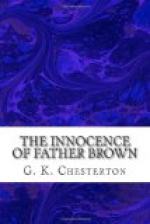“Such was the valour of that English thousand, and such the genius of their commander, that if they had at once attacked the hill, even their mad march might have met some luck. But the evil mind that played with them like pawns had other aims and reasons. They must remain in the marshes by the bridge at least till British corpses should be a common sight there. Then for the last grand scene; the silver-haired soldier-saint would give up his shattered sword to save further slaughter. Oh, it was well organised for an impromptu. But I think (I cannot prove), I think that it was while they stuck there in the bloody mire that someone doubted— and someone guessed.”
He was mute a moment, and then said: “There is a voice from nowhere that tells me the man who guessed was the lover ... the man to wed the old man’s child.”
“But what about Olivier and the hanging?” asked Flambeau.
“Olivier, partly from chivalry, partly from policy, seldom encumbered his march with captives,” explained the narrator. “He released everybody in most cases. He released everybody in this case.”
“Everybody but the general,” said the tall man.
“Everybody,” said the priest.
Flambeau knit his black brows. “I don’t grasp it all yet,” he said.
“There is another picture, Flambeau,” said Brown in his more mystical undertone. “I can’t prove it; but I can do more—I can see it. There is a camp breaking up on the bare, torrid hills at morning, and Brazilian uniforms massed in blocks and columns to march. There is the red shirt and long black beard of Olivier, which blows as he stands, his broad-brimmed hat in his hand. He is saying farewell to the great enemy he is setting free—the simple, snow-headed English veteran, who thanks him in the name of his men. The English remnant stand behind at attention; beside them are stores and vehicles for the retreat. The drums roll; the Brazilians are moving; the English are still like statues. So they abide till the last hum and flash of the enemy have faded from the tropic horizon. Then they alter their postures all at once, like dead men coming to life; they turn their fifty faces upon the general—faces not to be forgotten.”
Flambeau gave a great jump. “Ah,” he cried, “you don’t mean—”
“Yes,” said Father Brown in a deep, moving voice. “It was an English hand that put the rope round St. Clare’s neck; I believe the hand that put the ring on his daughter’s finger. They were English hands that dragged him up to the tree of shame; the hands of men that had adored him and followed him to victory. And they were English souls (God pardon and endure us all!) who stared at him swinging in that foreign sun on the green gallows of palm, and prayed in their hatred that he might drop off it into hell.”
As the two topped the ridge there burst on them the strong scarlet light of a red-curtained English inn. It stood sideways in the road, as if standing aside in the amplitude of hospitality. Its three doors stood open with invitation; and even where they stood they could hear the hum and laughter of humanity happy for a night.




